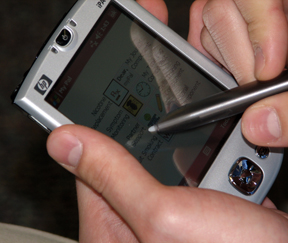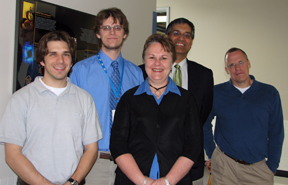 |
A specially designed Personal Digital Assistant (PDA) will help smokers distract and delay their urge to smoke. |
Lynne Buchanan, Ph.D., is counting on that accessibility.
An associate professor in the UNMC College of Nursing, Dr. Buchanan is asking smokers to reach for the specially designed Personal Digital Assistant (PDA) to help distract and delay their urge to smoke.
The prototype, which is being designed at the University of Nebraska at Omaha, College of Information Science and Technology, is part of a new clinical smoking cessation program, developed by the UNMC College of Nursing. The eight-week program, which started March 1, includes one-on-one counseling with nurse practitioners who are certified smoking cessation specialists.
“The program is filling a need,” said Dr. Buchanan, a board certified advanced practice nurse with an extensive research and clinical background working with people who are addicted to nicotine. “The PDA is a unique way to distract and delay their urge to smoke. It also allows us to get real-time feedback during their journey to quit.”
The program, based on customized, scientifically proven systems, soon will incorporate the hand-held device to see what impact it may have on helping smokers to quit smoking. During the pilot study, one-third of the participants will receive the PDA, which allows patients to read about nicotine replacement options, monitor symptoms and journal their experiences. In addition, smokers will be able to play games as a way to distract and delay their urge to smoke.
 |
Lynne Buchanan, Ph.D., with the UNO College of Information Sciences & Technology team designing the PDA for her smoking cessation study. From left are: Zachary Fowler, Michael Kane, Deepak Khazanchi, Ph.D., and Ken Dick, Ph.D. |
The UNMC/UNO collaboration allows students to expand their technological skills with actual projects, said Ken Dick, Ph.D., chairman of the Department of Telecommunications at UNO and senior research fellow for the College of Information Science and Technology. “We want them flippin’ (computer) bytes instead of flipping burgers,” he said.
Inside The Peter Kiewit Institute at UNO, sophomore Michael Kane helped transfer Dr. Buchanan’s smoking cessation manual onto the hand-held computer. As a result, smokers can use the device to record urges, seek quit smoking information, and distract their smoking urges by playing games.
Phase one of the study includes patient referrals from the medical center, Dr. Buchanan said. Phase two will include expanding the services to the general public, including the workplace.
The fee for service program, developed on evidence-based practice guidelines, includes one-on-one counseling with nurse practitioners that are certified smoking cessation specialists, Dr. Buchanan said. Following an interview to assess the person’s smoking history and reasons to quit, counselors combine counseling, lifestyle advice, direct support and drug therapies to help smokers quit and not relapse. Counselors discuss self-efficacy temptations and then role-play to help smokers better respond.
“The literature is really clear,” Dr. Buchanan said. “Client self-efficacy or confidence is related to smoking cessation.”
And if proven successful, the specially designed hand-held computer may also play a role in smoker’s breaking the habit.
For more information on the program, call 559-6629 or 559-4122. Dr. Buchanan may be reached via e-mail at lbuchanan@unmc.edu.